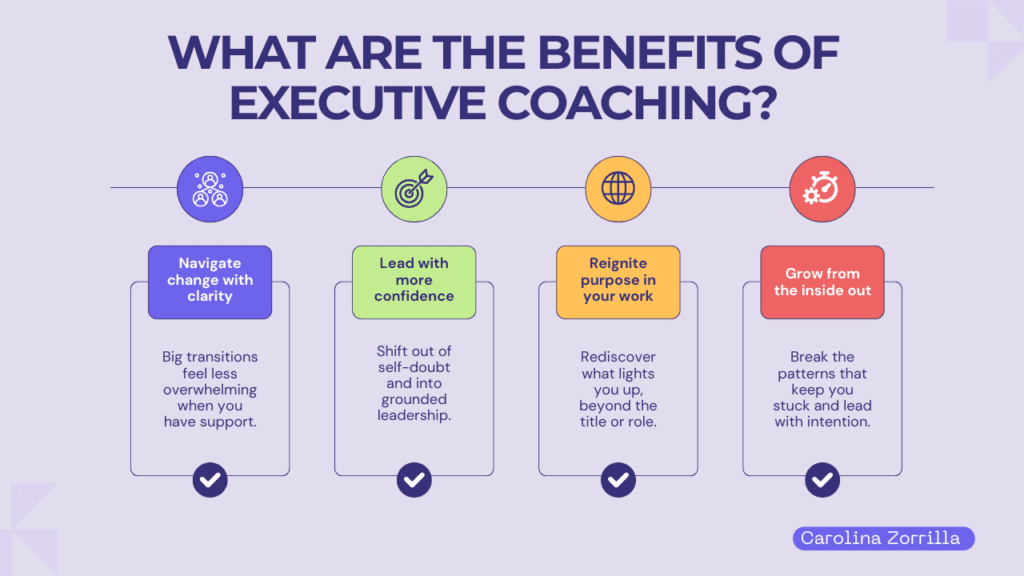You’ve seen the posts. The glossy testimonials. The buzzwords like “uplevel your leadership” and “step into your power.” But what actually works in executive and leadership coaching—and what’s just fluff that sounds good but leads nowhere?
If you’ve ever thought, Is this just expensive advice? or Do I really need a coach?—you’re not alone. The truth is, coaching can be life-changing… or it can be surface-level noise. The difference? The coach, the approach, and your own readiness.
This blog breaks down what real coaching looks like, what it isn’t, and how to find someone who actually helps you grow—not just gives you a pep talk.
Table of Contents
Executive vs. Leadership Coaching—What’s the Difference?
Executive coaching is about performance, presence, and decision-making at a high level. It’s ideal when you’re navigating complex roles, big responsibilities, and the weight of visibility. Think: board meetings, high-stakes strategy, organizational change and influence.
Leadership coaching zooms in more on mindset, communication, emotional intelligence, and relationships—how you lead others and yourself. It’s especially powerful when you’re managing people, feeling stuck in your growth, or craving a more aligned way of leading.
The truth? They often overlap. And that’s a good thing. Great executive coaching includes leadership development. Great leadership coaching sharpens executive clarity. The best coaches know how to work across both—because real leadership isn’t just performance. It’s self-awareness in motion.

What Real Coaching Looks Like (Not Just Fancy Talk)
Let’s be honest: anyone can call themselves a coach. But real coaching goes way beyond “accountability” or surface-level advice.
At the core of effective coaching is emotional intelligence and self-leadership. Coaches help you notice how you think, how you react, what patterns are running the show—and then help you shift those things with intention. It’s not about fixing. It’s about getting clarity, expanding and taking action.
As an executive coach I use powerful inquiry, reflection and other valuable tools like personality assessments, somatic work, or mindset frameworks and PSYCH-K, to help my clients access deeper insight. Others rely on theoretical frameworks, short term results and linear problem solving. But no matter the method, the goal is the same: to help you lead from a place of clarity and alignment.
Good coaching is not advice-giving. It’s a space where your assumptions get challenged, your growth gets supported, and your goals get clearer—not just bigger. You leave each session with new awareness and an action step, not just a motivational buzz.
Who Actually Benefits from Coaching?
Executive and leadership coaching is not just for the C-suite.
It’s for rising leaders, entrepreneurs, founders, and anyone holding space for others while trying to hold themselves together. It’s for women navigating mid-career transitions, people leading teams through change or burnout, and professionals who’ve stopped feeling inspired by the roles they used to love.
Coaching helps when you’re in a season of decision-making, life crisis, identity shifts, or growth that feels exciting and terrifying at the same time. You might be at the top of your game—and still feel stuck. That doesn’t mean you’re broken. It means you’re ready to grow again.

Addressing the Skeptics: What Coaching Can’t Do
Coaching is powerful, but it’s not magic.
It won’t fix a toxic job. If you’re in a harmful or misaligned environment, coaching can help you see that clearly—but it won’t make your boss kinder or your organization more values-driven.
It’s also not therapy. Coaching isn’t meant to heal past trauma. That said, it does go deep. It can bring up patterns rooted in old experiences—but it stays focused on who you are now and what you want next.
And here’s the real kicker: coaching only works if you’re ready. Ready to take responsibility. Ready to challenge your own thinking. Ready to act. You don’t have to be perfect or prepared. But you do need to be honest.
How to Choose a Coach You Can Actually Trust
Choosing the right coach is just as important as deciding to get one.
Here’s what to look for: someone with training or credentials, with proven experience working as a coach, (not just lived experience), someone who is curious and is constantly growing and learning. A real leader that walks the talk and most importantly someone who makes you feel safe enough to be honest—but strong enough to take action.
Red flags? Coaches who rely on cookie-cutter formulas, overpromise results, with a fixed mindset, judgemental, poor listener, or someone that turns every session into an emotional unloading with no clear connection towards your goals. A good coach knows when to hold space and when to challenge you.
Before you hire someone, ask:
- How do you support clients when they feel stuck?
- What tools or methods do you use?
- How do you track progress?
And don’t underestimate the power of vibe. The best coach for you won’t just sound impressive—they’ll make you feel seen, safe, important and understood. If they only care about your job title and not your full self, keep looking.
FAQs About Work-Life Balance Over Career Advancement
Is coaching only for people in the C-suite?
Not at all. It’s for anyone in a leadership position—or who wants to grow into one. If you’re managing people, navigating growth, or stuck in decision loops, coaching can help.
What’s the difference between executive coaching and therapy?
Therapy focuses on healing the past. Coaching is future-focused—it helps you lead better, feel more aligned, and take bold action without staying stuck in old patterns.
Can I trust a coach to give me real advice?
Good coaches don’t give advice. They help you access your own clarity and power through deep reflection and tools. It’s not about telling you what to do—it’s about helping you own what you truly want.

About Executive Coach & Author
Hola, I’m Carolina Zorilla, an Executive & Leadership Coach helping high-achievers break free from burnout and build fulfilling careers—without sacrificing success. After 12 years in corporate, I realized chasing promotions wasn’t enough. Now, I coach professionals to redefine success, set boundaries, and find balance.
That’s why I made it my mission to help high-achieving professionals break free from burnout, redefine success on their terms, and build careers that fuel both ambition and well-being. Through coaching, I’ve helped leaders and entrepreneurs find balance, confidence, and fulfillment—without sacrificing growth.
If you’re ready to create a career that supports your life (not the other way around), let’s talk. Book a discovery session here.
Conclusion
Executive and leadership coaching isn’t magic—and it’s not for everyone. But if you’re done with surface-level “fixes” and ready to lead yourself with purpose and power, the right coach can help you build the next version of your life and leadership.
You deserve a space that’s not about fixing you—but about helping you remember your voice, your power, and your direction. Just make sure the coach you choose sees all of you—not just your LinkedIn title.


